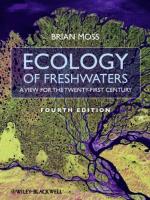|
This section contains 1,607 words (approx. 6 pages at 300 words per page) |

|
The study of fresh water habitats is called limnology, coming from the Greek word limnos, meaning "pool, lake, or swamp." Fresh water habitats are normally divided into two groups: the study of standing bodies of water such as lakes and ponds (called lentic ecosystems) and the study of rivers, streams, and other moving sources of water (called lotic ecosystems). Another important area that should be included is fresh water wetlands.
The historical roots of limnology go back to F. A. Forel, who studied Lake Geneva, Switzerland, in the late 1800s and E. A. Birge and C. Juday, who studied lakes in Wisconsin in the early 1900s. More recently, the modern "father" of limnology can arguably be attributed to G. Evelyn Hutchinson, who died in 1991 after teaching at Yale University for more than 40 years. Among his prolific writings are four treatises on limnology which offer...
|
This section contains 1,607 words (approx. 6 pages at 300 words per page) |

|


